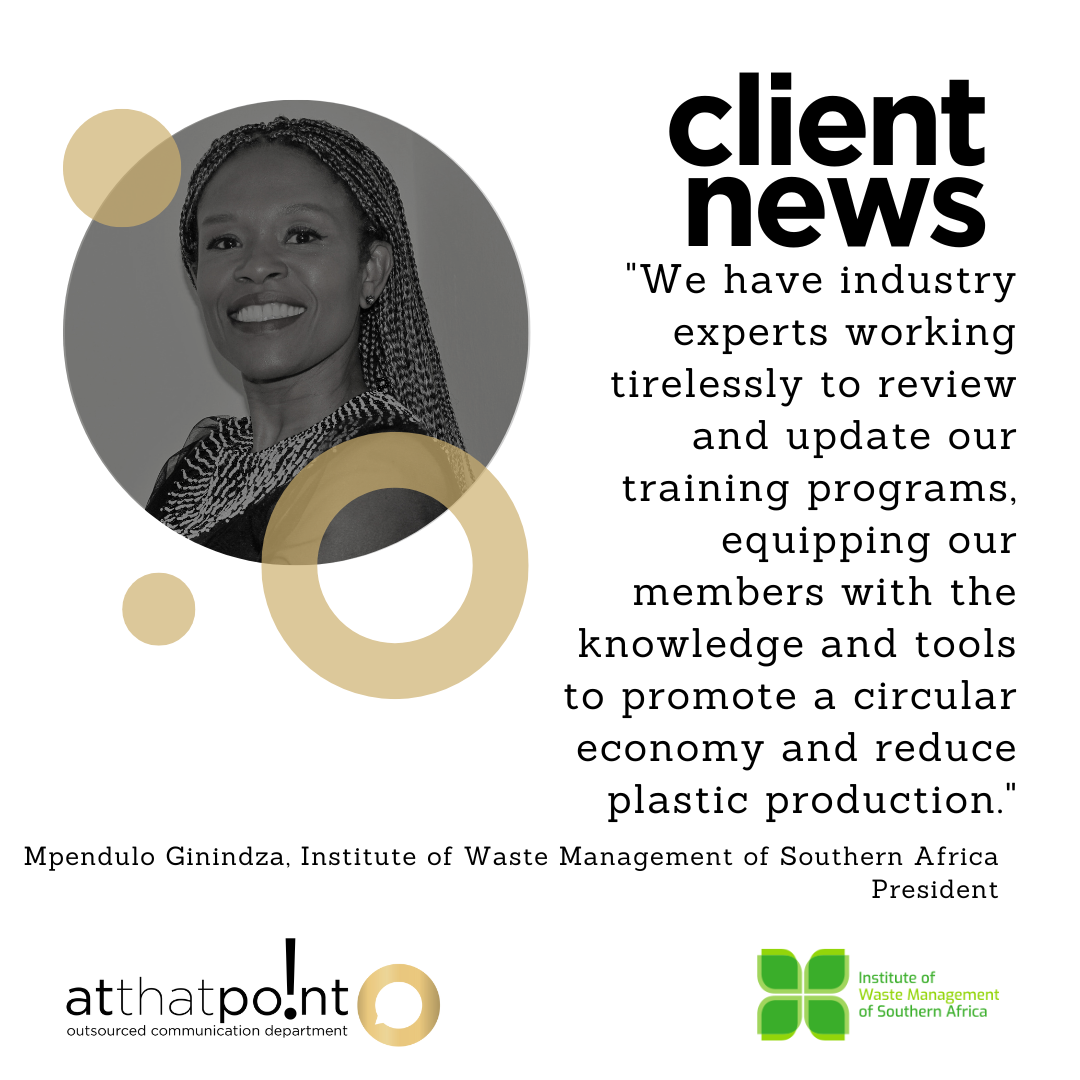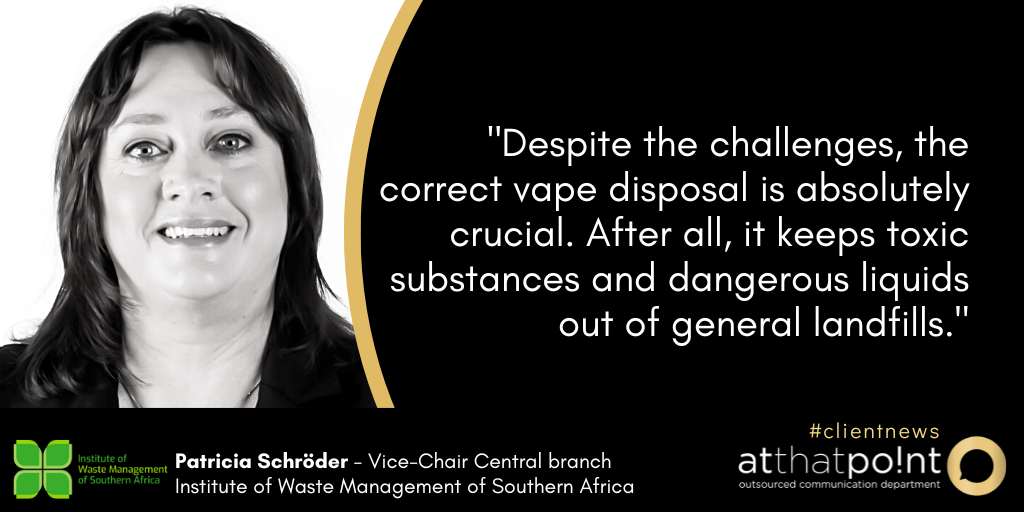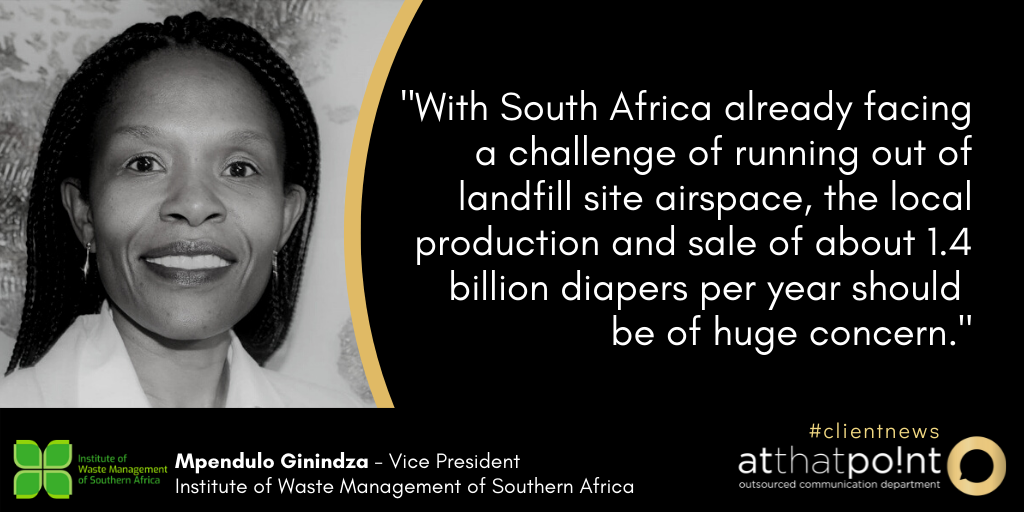 This World Earth Day April 22, 2024, the Institute of Waste Management of Southern Africa (IWMSA) underscores the critical need for concerted efforts to combat plastic pollution, a pressing environmental challenge in South Africa. This year's theme, "Planet vs. Plastics," resonates deeply with the ongoing battle against plastic pollution in our country, emphasising the urgency of transitioning towards sustainable waste management practices and reducing plastic production. According to Mpendulo Ginindza, President of the IWMSA, "The plastic economy in South Africa is based on a linear model of take-make-waste, leading to significant environmental consequences. Improper waste management results in plastic waste infiltrating our rivers, oceans, and communities, posing threats to wildlife and ecosystems.” She says that even seemingly sustainable solutions need to be rethought when it comes to how we handle waste management. According to the Ewastemonitorinfo.org’s new report, The global E-waste Monitor 2024, the green transition and the connecting of off-grid communities will lead to a quadrupling of waste from photovoltaic panels from 0.6 billion kg in 2022 to 2.4 billion kg in 2030. “Small equipment, such as video cameras, toys, microwave ovens and e-cigarettes, also constitutes the largest category of e-waste in terms of mass, accounting for 20 billion kg in 2022, or almost one-third of the world’s total e-waste,” says Ginindza. In alignment with World Earth Day's "Planet vs. Plastics" theme, the IWMSA is devoted to raising awareness about the detrimental impacts of plastic pollution and promoting sustainable solutions to address this pressing issue. Through initiatives such as community clean-ups and educational campaigns, the IWMSA aims to empower individuals, businesses, and government agencies to take proactive steps towards reducing plastic consumption and promoting a circular economy. "We have industry experts working tirelessly to review and update our training programs, equipping our members with the knowledge and tools to promote a circular economy and reduce plastic production," says Ginindza. Collaboration Among Government Agencies, Businesses, and Individuals is needed The IWMSA acknowledges the importance of collaboration among government agencies, businesses, and individuals in tackling plastic pollution and promoting sustainable waste management practices. Through strategic partnerships and collaborative initiatives, the IWMSA wants to harness collective efforts towards achieving the ambitious goal of reducing plastic production by 60% by 2040. “As a member driven organisation, we require participation of members so that we can effectively engage stakeholders. IWMSA has MOUs with strategic partners, these include the DFFE, various universities and NGOs, and industries that support our vision. If we are to achieve the 2040 targets, we must work together. It requires collaboration and participation,” says Ginindza. Despite facing challenges in achieving this target, including the need for increased member participation and stakeholder engagement, the IWMSA remains steadfast in its commitment to driving progress towards a sustainable future. Success stories, such as the development of professionals through IWMSA programs, underscore the organisation's impact in promoting environmental stewardship and responsible waste management practices. Building on this commitment, the International Solid Waste Association (ISWA), played a key role at the first session of the Intergovernmental Negotiating Committee (INC-1) on Plastic Pollution. The meeting, held in Punta del Este, Uruguay from November 28 to December 2, 2022, focused on addressing the severe issue of plastic pollution as part of a wider environmental crisis. During the session, ISWA engaged with various stakeholders and member states, advocating for the development of an international legally binding agreement to combat plastic pollution effectively. The IWMSA has shared ISWA’s recommendations with the Department of Forestry, Fisheries and the Environment who are the National Focal Point. ISWA’s contribution, crafted with insights from its Science and Technical Committee and finalised by a Task Force coordinating committee, is now available on the United Nations Environment Programme website. Consumer Education and Empowerment Key to Fostering Sustainable Consumption Habits As consumers play a crucial role in addressing the plastic pollution crisis, the IWMSA emphasises the importance of consumer education and empowerment in fostering sustainable consumption habits. By making informed choices and supporting initiatives that promote waste management and recycling, individuals can contribute to the shift towards a circular economy. “Looking ahead, the IWMSA's priorities include advancing its mission of promoting responsible waste management and environmental stewardship in South Africa, with a focus on driving the transition towards a circular economy and creating value from secondary resources to support job creation and economic growth,” concludes Ginindza. ENDS MEDIA CONTACT: Idele Prinsloo, [email protected], 082 573 9219 www.atthatpoint.co.za For more information on IWMSA please visit: Website: Home (iwmsa.co.za) X: @IWMSA LinkedIn: Institute of Waste Management of Southern Africa Facebook: Institute of Waste Management of Southern Africa
0 Comments
 Whether you're a corporate event planner or a parent hosting a family party this Easter Weekend, you'll probably have your hands full with planning and preparations. "This year, it's equally important to work waste management into your do," says Mpendulo Ginindza, President of the Institute of Waste Management of Southern Africa (IWMSA). Countrywide Easter events can put a huge strain on the national waste management infrastructure and that's bad news for the environment. So, let’s commit to doing things differently this time around. Planning a Zero Waste event Planning for waste management means having the right mindset. You can be a waste-free event pro by following these guidelines from Mpendulo:
Extra tips
This Easter bash is going to be your best one yet, all because of your waste management skills. That's extra cause for celebration. "The IWMSA thanks you for your efforts and wishes all South Africans a happy, safe and waste-free Easter," says Mpendulo. ENDS MEDIA CONTACT: Idele Prinsloo, [email protected], 082 573 9219, www.atthatpoint.co.za For more information on IWMSA please visit: Website: Home (iwmsa.co.za) Twitter: @IWMSA LinkedIn: Institute of Waste Management of Southern Africa Facebook: Institute of Waste Management of Southern Africa Every industry suffers its fair share of myths, and waste management is no different.
"We need to separate the truth from the half-truths and nonsense that can hinder our progress towards a waste-free society," says Mpendulo Ginindza, President of the Institute of Waste Management of Southern Africa. Here are her 10 top myths about waste management. Myth 1: Waste Management is only about garbage disposal How to dispose of one's garbage is just a small part of waste management, a complex discipline that reaches across industries and national borders. It embraces strategies for ethical, sustainable and responsible product development, manufacture, consumption and disposal, including the destruction, storage, recycling or reusability of waste. Myth 2: Waste management is solely the government's responsibility Waste management is, in fact, the responsibility of everyone who generates waste, including households, retailers and, under recent legislation, product manufacturers. They are assisted by the waste managers who direct day-to-day operations in the waste industry. Myth 3: The goal of Waste Management is to save the environment While environmental preservation is a key goal of waste management, it equally benefits society and the economy. This includes protecting the health of humans, animals and plant life by preventing them and their surroundings from becoming contaminated. Contamination can threaten food and water supplies, and therefore has dire economic implications. Myth 4: Landfills are the only solution Until now, landfills have been a necessary evil, not a solution. Modern waste management comprises a range of alternative strategies that seek to reduce landfills and minimise our dependence on them. Myth 5: Recycling is too expensive and inefficient In some cases, maybe, but if this myth were really true, recycling companies would not survive long, let alone profit as they do. Every year, recycling technologies become more advanced, cost-effective and efficient, ensuring recycling remains a go-to waste management practice. Myth 6: Everything must be recycled Unfortunately, this myth is the result of retail marketing focusing only on recycling because the term is popular with consumers. In fact, not all waste is suitable for recycling and other methods exist to handle anything that is not. They include incineration, composting, waste-to-energy, reuse and others. Myth 7: We need to maximise recycling rates If only. However, achieving a maximum rate of recycling depends on many factors, such as recycling technologies, capabilities and throughput capacity as well as economic viability. Every solution has limits and, as mentioned, attention and resources must also be given to managing waste that cannot be recycled at all and for which better techniques exist. Myth 8: Stricter regulation is the answer Do more traffic cameras prevent people from speeding? Usually not. Regulation only sets the standard for compliance. It must be supported by education and public awareness programmes that teach people the benefits of positive waste management behaviours. Training needs to start at home and in kindergarten, and continue throughout high school, university and into employment. Myth 9: Waste Management is a secondary concern You may be surprised that many of today's global problems, especially the climate crisis, are directly or indirectly linked to poor waste management. It is actually a primary concern because it is deeply embedded in so many others. Myth 10: Third world countries can't afford waste management The truth? We cannot afford not to embrace waste management because that will cost us dearly in the long run. In fact, we have the opportunity to lead the world by developing advanced waste management techniques that fit the African context. Busting myths Successful waste management demands the participation of all stakeholders, including consumers, businesses, and government. Unfortunately, waste management myths can hamper our initiatives and hinder our progress. "We need to educate ourselves on waste management truths so we can develop effective strategies, and each play a meaningful role in reducing waste," says Ginindza. ENDS MEDIA CONTACT: Idele Prinsloo, [email protected], 082 573 9219, www.atthatpoint.co.za For more information on IWMSA please visit: Website: Home (iwmsa.co.za) X (Twitter): @IWMSA LinkedIn: Institute of Waste Management of Southern Africa  As vaping grows in popularity, unfortunately so does the harm it causes to the environment. It is especially trendy amongst younger users, though many seem to be unaware that vapes are actually electronic waste, cautions Patricia Schröder, Vice President at The Institute of Waste Management of Southern Africa (IWMSA). Toxin leaks due to incorrect disposal can be hazardous A "vape," or electronic cigarette, is a device that heats up a liquid to create a vapor that the user then inhales. Since they have a heating element and lithium-ion batteries, vapes are considered e-waste. But vape waste disposal is a big undertaking, because of the many chemicals and materials that are used in them. “Despite the challenges, the correct vape disposal is absolutely crucial. After all, it keeps toxic substances and dangerous liquids out of general landfills,” explains Schröder. “Even in the form of residues, these toxins can leak into natural habitats and river systems, where they can eventually contaminate our freshwater sources.” She says these dangerous elements can, however, be kept out of the environment by recycling and good product management. “Additionally, the materials, including the harmful components, can be recovered for use in other applications.” Informed users are responsible users Schröder notes that all electronic waste was banned from landfills in August 2021. “And due to the fact that vape cartridges contain both electronic components and packaging, they are included in this legislation. However, there is definitely still a need for greater acceptance and understanding on the part of both manufacturers and consumers.” She says vapers should ensure their disposable cartridges are collected through a “Mandatory Take Back-program” and then delivered to a recycling facility for environmentally sound management of the waste and to recover resources. “Return the used vape cartridges to the merchants who sold them, and preferably, only support vendors that will properly manage the vape cartridges and have proof of this,” she elaborates. “Under no circumstance dispose of your vape cartridges in normal waste bins as these go to general landfill and will cause pollution of this environment.” According to Schröder, so-called “end-of-life care” and recycling of vape goods are specialised tasks that call for very specific technology, expertise, and management approaches. “It is the only way we can ensure environmentally sound management that does not adversely affect the environment or the handlers of the waste products.” ENDS MEDIA CONTACT: Rosa-Mari Le Roux, [email protected], 060 995 6277, www.atthatpoint.co.za For more information on IWMSA please visit: Website: http://www.iwmsa.co.za/ Twitter: @IWMSA LinkedIn: Institute of Waste Management of Southern Africa Facebook: Institute of Waste Management of Southern Africa Disposable Nappies take centuries to disintegrate - A Call for Action to Manufacturers and Consumers4/7/2022  In a landfill, a single disposable diaper can take 200 to 500 years to disintegrate. “With South Africa already facing a challenge of running out of landfill site airspace, the local production and sale of about 1.4 billion diapers per year should be of huge concern,” warns Mpendulo Ginindza, Vice President of the Institute of Waste Management of Southern Africa (IWMSA). “A child using disposable diapers is believed to produce up to 900 kg of nappy waste in the first two years of life.” Ginindza contends that consumers, who are increasingly moving away from single-use plastic items like straws and bags, should also acknowledge that nappies are made of single-use plastic. "These disposable diapers' production and disposal leave a large carbon footprint. Their manufacturing involves crude oil, water, and wood pulp." She adds that when they are disposed of improperly, diapers that are left lying around expose children, waste collectors, and animals to them. “It is often misleading to claim on the label that disposable diapers are "biodegradable" or "eco-disposable ''. These nappies typically include mixed materials which require different environments in order to degrade; they cannot do so in a landfill. They cannot be thrown away in a standard compost bin either. " The resulting impact on health and the environment, Ginindza cautions, is huge. The role of diaper manufacturers in EPR The legal criteria for Extended Producer Responsibility (EPR) came into effect in May 2021. “These requirements put back the responsibility on paper, packaging and single-use product manufacturers and importers to assume responsibility for the complete life of the products they generate,” Ginindza explains. “Yet it is tricky to say where nappy manufacturers fall within these categories. Most often, they are considered as producers of hygiene products.” However, diapers are made, confined, and wrapped in plastic in bulk packaging. As a result, their contributions will be needed if EPR is to succeed. “We are still in the early days of implementation of these requirements. All stakeholders are working hard to understand and implement these requirements,” Ginindza says. Small consumer actions can make a world of difference By making conscious decisions regarding disposal, consumers can make a difference. Ginindza says she has two suggestions for those who don’t know where to start. “Consumers could perhaps consider adopting reusable nappies part-time,” she suggests. “We cannot deny that there is a valid or reasonable need for disposable nappies. They are sometimes used for sick or elderly people to help keep them clean. However, we can normalise modern cloth diapers and promote reusable diapers in a positive way.” She continues by saying that there is a lot of assistance available from senior family members and online tutorial videos to help families get to grips with reusable nappies. “Secondly, we have to work towards separation at source to help control odors and downstream safety, health and environmental risks.” In conclusion, Ginindza notes that consumers do not need to aim to be perfect at doing all of this. “Millions of people making imperfect changes can and will make a difference.” ENDS MEDIA CONTACT: Rosa-Mari Le Roux, [email protected], 060 995 6277, www.atthatpoint.co.za For more information on IWMSA please visit: Website: http://www.iwmsa.co.za/ Twitter: @IWMSA LinkedIn: Institute of Waste Management of Southern Africa Facebook: Institute of Waste Management of Southern Africa |
AuthorWrite something about yourself. No need to be fancy, just an overview. Archives
June 2024
Categories
All
|

 RSS Feed
RSS Feed